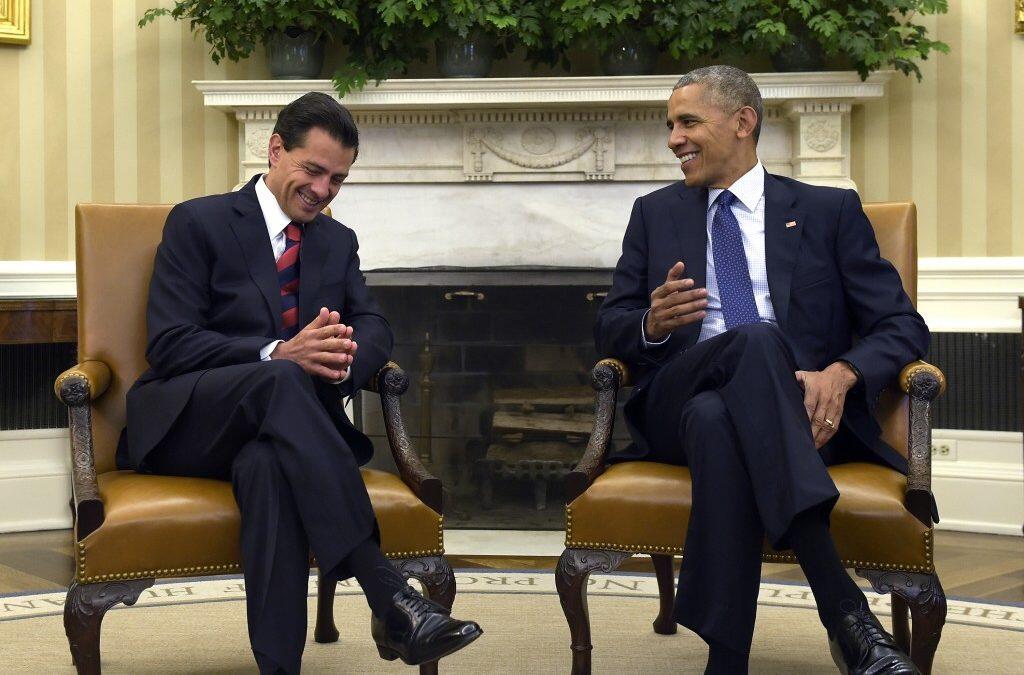A man who openly vilifies Mexicans and Americans of Mexican descent accepted the Republican presidential nomination on Thursday in Cleveland. He has said that “Mexico is not our friend” and promised to make Mexico pay for a border wall. His supporters chanted “build that wall” during his acceptance speech.
He also has claimed that climate change — which threatens the communities and integrated economies and ecosystems of North America — is a hoax.
The next day, President Obama and Mexican President Enrique Peña Nieto took a moment to show what is possible when allies work shoulder-to-shoulder to address the common problem of climate change.
“The United States values tremendously our enduring partnership with Mexico and our extraordinary ties of family and friendship with the Mexican people,” Obama said at a Friday press conference at the White House.
He and Peña Nieto announced a set of efforts to curb carbon pollution that build on the outcomes of the North American Leaders’ Summit that was held on June 29 in Ottawa.
At the summit, the United States, Mexico, and Canada laid the foundation for a continent-wideclimate and clean energy strategy, which included a pledge to reach 50 percent clean energy generation across the continent by 2025. It also included a pledge from Mexico to join the U.S.-Canada commitment from earlier this year to reduce emissions of methane — a potent greenhouse gas — from their oil and gas sectors 40 to 45 percent by 2025.
On Friday, President Obama and President Peña Nieto took steps to help ensure that the promises of the summit will be met. The leaders committed to sustained collaboration — including the ongoing meetings and technical discussions that are needed to reduce emissions of short-lived climate pollutants such as methane and black carbon. They also announced the inaugural meeting of the U.S.-Mexico Energy Business Council in the fall and another engagement before February to promote investment in clean energy.
Such cooperation will help curb greenhouse gas emissions in the U.S. and Mexico — and also will strengthen the leadership role of these countries in the global effort to limit climate change. As major emitters at different stages of development, North American countries could become an influential coalition for international climate action — and a particularly vital one, given the current turmoil in the European Union. It is noteworthy that the U.S. and Mexico have established a work plan with Canada to complete long-term low-carbon development strategies this year, which will set a standard and create an expectation that other countries will follow suit in advance of the 2020 deadline in the Paris Agreement.
Also of significance in Friday’s announcement is Mexico’s plan to start using the social cost of carbon this year. Since 2010, the U.S. executive branch has considered the social cost of carbon — which refers to the damage to society caused by each ton of greenhouse gas pollution — when evaluating potential regulations that would affect emissions. Mexico’s adoption of this practice would be a step toward the ultimate goal of creating a low-carbon continent.
“I am proud of what we’ve achieved together and proud to stand with you and the Mexican people as our brothers and sisters in progress,” Obama said to Peña Nieto at the press conference.
There is ample room for the North American climate relationship to evolve and be strengthened over time. In the future, the leaders could collaborate, for example, to ensure that infrastructure investments are climate-compatible. But the trilateral commitments from the June summit and Friday’s decisions to help ensure their fulfillment could prove to be an important component of President Obama’s climate legacy. Full realization of a continent-wide transition to clean energy, however, will require that future administrations focus on building bridges rather than walls.
Gwynne Taraska is the associate director of Energy Policy at the Center for American Progress.
The Center for American Progress recently has produced a report — in partnership with an alliance of research institutions from the United States, Mexico, and Canada — to make recommendations for a coordinated North American climate strategy.
Source: ThinkProgress











